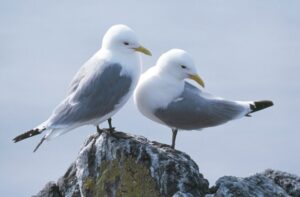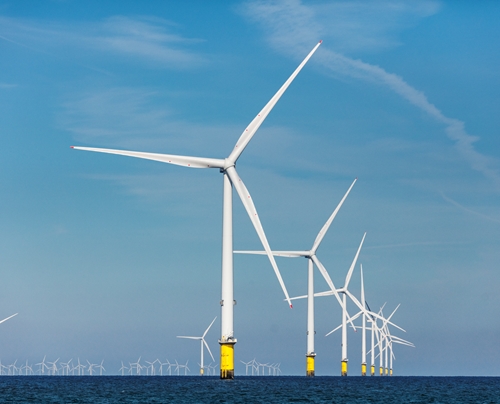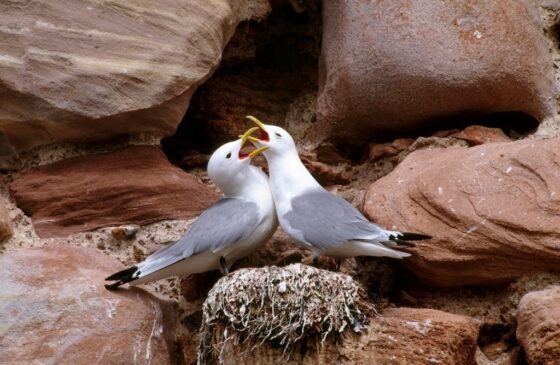
Crown Estate’s £12 million research to protect marine and plan for eco wind farms

The Crown Estate is partnering with a range of UK-wide expert bodies to launch three research projects that will help to enable the coexistence of offshore wind farms with a thriving marine environment.
Led by Natural England, Scottish government and the Royal Society for the Protection of Birds, the projects will be delivered and supported by many other public, private and charitable organisations.
They will explore a wide range of environmental issues, identify evidence gaps, and inform how we can collectively implement positive change by improving understanding among key decision makers of how offshore wind deployment could affect marine habitats and wildlife in combination with other activities. This will ensure that we maximise the opportunity of UK offshore wind power while protecting and enhancing marine biodiversity, the Crows Estate says.
The projects comprise:
- POSEIDON (Planning Offshore Wind Strategic Environmental Impact Decisions) – led by Natural England, this four-year project will improve the knowledge of environmental risks across UK waters and provide tools for future offshore wind planning.
- PrePARED (Predators and Prey Around Renewable Energy Developments) – a four-year partnership led by Scottish government’s Marine Scotland directorate and co-funded by Crown Estate Scotland that will help improve understanding of how seabirds, marine mammals and fish respond to offshore wind farms.
- Remote Tracking of Seabirds at Sea – the Royal Society for the Protection of Birds will harness novel tracking techniques over a five-year period to fill critical knowledge gaps in the movements and populations of seabirds, such as puffin and kittiwake.
The Offshore Wind Evidence and Change programme is being delivered in partnership with the Department for Business, Energy and Industrial Strategy (BEIS) and the Department for Environment, Food and Rural Affairs (Defra), working closely with Scottish, Welsh and Northern Ireland government bodies, regulators, NGOs and a broad range of industry representatives that play a role in planning for the future of offshore wind.
“As we face the twin crises of biodiversity loss and climate change, protecting our natural world has never been more important,” explains Dan Labbad, chief executive of The Crown Estate. “As managers of the seabed around England, Wales and Northern Ireland, we play a vital role in helping to safeguard our precious marine environment whilst shaping, innovating, informing and enabling the development of offshore wind for the long-term benefit of the nation. This investment, delivered in partnership with expert stakeholders, is the latest example of our continuing drive to provide world-class data and evidence to support both government and the industry in making the best decisions to unlock the pathway to net zero, in harmony with healthy, biodiverse seas.”
So far, 25 projects have been awarded funding, with three completed and 13 underway, gathering data and evidence that will help to find space in a busy seabed, enable better understanding of how offshore wind affects the environment and habitats, and inform decision making and understanding around environmental benefits and provision of compensation.

“I welcome this important partnership with The Crown Estate which will help in our efforts to safeguard the marine environment as we continue to grow the offshore wind capacity for a cleaner greener future,” says Michael Matheson, cabinet secretary for Net Zero, Energy and Transport, Scottish government. “The PrePARED project will, for the first time, concurrently study predator, including seabird and marine mammals, and prey distribution and behaviour in and around offshore wind farms in Scotland providing critical insight into cumulative effects from large scale offshore wind development for key species.
“By bringing together expertise from government, academia, nature conservation agencies and industry, the PrePARED project will address critical knowledge gaps that are barriers to the sustainable offshore wind development which is instrumental in helping meet the Scottish Government’s renewable energy targets and reach net zero emissions by 2045.”

Tony Juniper, chair of Natural England, adds: “It is vital our efforts to decarbonise power go hand-in-hand with plans to protect and restore nature. We are delighted to receive this investment, allowing us to develop offshore wind planning tools and map environmental risk, balancing protecting our most vulnerable habitats and species whilst also helping us benefit from the vast renewable power resources that exist offshore. This UK-wide project will help realise our vision of a thriving marine and coastal environment alongside low impact offshore wind energy, tackling both of the climate change and nature emergencies together.”
The Crown Estate is committed to protecting and enhancing biodiversity across all areas of its activity. This programme is part of its wider investment in marine spatial data and evidence to improve productivity, drive value and help develop a holistic understanding of the seabed. Last year, The Crown Estate undertook a key resource area study to determine where future potential might lie for both fixed and floating wind. Data and insights from this study have informed conversations about the sustainable growth of the offshore wind industry.
The Marine Data Exchange is another tool used to share data and encourage evidence-based decisions. The first of its kind, it holds offshore survey data collected by The Crown Estate’s customers throughout the lifetime of a project to help make better choices in the future.

Jenna Hegarty, deputy director at the Royal Society for the Protection of Birds, concludes: “We are thrilled that the Offshore Wind Evidence and Change programme is supporting our partnership project that will use innovative technology to address key knowledge gaps for our globally important seabirds. The threat to our seas has never been greater and decisions made in this decade will determine the future for species like puffin and kittiwake; identifying the most important places for wildlife and understanding the impacts of development is vital to ensure we make the best possible decisions for climate and nature. The outputs from this project will help to determine the locations of future windfarms and reduce the current challenges that face both the offshore wind industry and nature – a true collaboration for a sustainable and nature friendly net zero.”
All images courtesy of The Crown Estate
